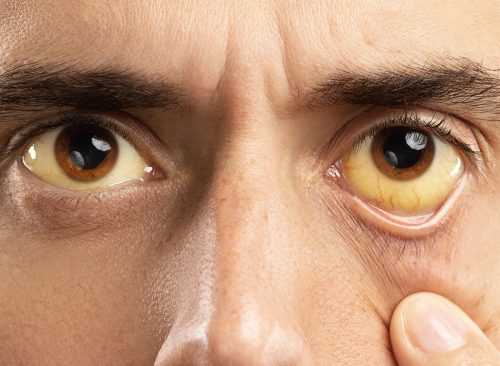19 Symptoms That May Actually Be Cancer, According to Doctors
Know the warning signs so you can seek help before it's too late.

Cancer is the second leading cause of death in the United States behind heart disease, according to the American Cancer Society—and detecting it as early as possible can make a huge difference when it comes to treatment and prognosis. These are certain signs and symptoms—many which you might brush off as harmless—that could be your body’s way of letting you know that something is wrong.
1
Fatigue and Lack of Energy
1
Fatigue and Lack of Energy

Everyone feels exhausted from time to time. However, if you are feeling chronically tired, it may be something more, including a variety of cancers. “A major symptom I see often is severe fatigue and lack of energy,” explains Michele C. Reed, DO, FAAFP. So what exactly does fatigue feel like? “Patients like to describe it as I just don’t feel right and do not want to do anything,” she says.
2
Blood in Urine
2
Blood in Urine

If something doesn’t feel or look right in your urine, you should have it checked out immediately. Dr. Reed explains that if there is any blood in your urine there could be something wrong with your Gastrointestinal Tract (GI) or Genitourinary Tract (GU) systems.
3
Increased Frequency of Urination
3
Increased Frequency of Urination

Of course you have to pee more if you are consuming more liquids, but if you start noticing an increased urgency or frequency in your urination—or even have trouble urinating at all—it could be a sign of cancers in the genitourinary tract or prostate, says Anees B. Chagpar, MD, a Yale Medicine breast surgeon.
4
Blood in Stool or Black, Tarry Stools

If you ever notice blood in your stool, don’t be totally panicked. Often times it can be ascribed to being hemorrhoids. However, Dr. Chagpar maintains it would also be something more serious, such as colorectal or other cancers. Always pay attention to your poop—especially if it changes color. According to Dr. Chagpar, if your feces start looking black and tarry, it could be a sign of gastric (stomach) cancer.
5
Chronic Coughing
5
Chronic Coughing

Everyone gets a cough, especially during cold and flu season. However, if your cough just doesn’t seem to go away, you should definitely have it checked out. According to Dr. Reed, there could be an issue in your pulmonary system.
6
Coughing up Blood or Blood Mucus
6
Coughing up Blood or Blood Mucus

While coughing up blood or bloody mucus can occur in an infection of the lungs—like bronchitis or pneumonia—it isn’t something you should ever overlook. “This sign should alert the physician that something is going wrong,” says Beatriz Amendola, MD, an expert in the field of Radiation Oncology and Radiation Therapy. “We must always think of the worst diagnosis and the possibility of lung cancer should be investigated.” Possible tests your physician may want to conduct include a CT scan of the chest or imaging studies.
7
Changes in Your Breasts
7
Changes in Your Breasts

There’s a reason why the CDC recommends that all women conduct self-exams of their breasts periodically, regardless of age or risk factor. Any breast discharge, change in skin texture, or nipple changes can all be signs of breast cancer, explains Dr. Reed. In case you are curious what to look out for, Know Your Lemons has a great diagram that makes it easy to identify any of the most common signs of breast cancer.
8
Unexplained Weight Loss
8
Unexplained Weight Loss

If you are losing weight but haven’t changed your diet or exercise routine, it can be a sign that something isn’t right with your body. “Losing weight is a goal of many people during a workout program, but unexplained weight loss is a concern,” states Allen Conrad, BS, DC, CSCS. If you are dieting and regularly exercising, he explains that a weight loss of two to three pounds a week can be expected. However, if you are losing much more than that and haven’t changed your daily activities, getting some tests done could help a problem before it advances. “A full body bone scan can help detect any abnormal areas of increased metabolic activity,” he says. “If anything of concern is found in your results, consult an oncologist for future instructions on care and treatment.”
9
Loss of Appetite
9
Loss of Appetite

In addition to weight loss, many people with cancer will also notice their hunger is suddenly waning, according to Adam Splaver, MD, a Miami cardiologist. “Cancer cells have a big energy requirement and use available sources for growth,” he explains.
10
Night Sweats
10
Night Sweats

Excessive sweating at night is an indication of the possibility of cancer—especially Lymphoma. “Patients will often describe their pillow as ‘soaked’ or as if they just jumped out of a swimming pool,” says Thanu Jey, BSc, DC, CSCS, FCE, Clinic Director at Yorkville Sports Medicine Clinic. “While many things can cause sweating at night, if it is an ongoing problem regardless of the external circumstances, in conjunction with other signs and symptoms listed here, it is definitely worth speaking to your doctor,” he urges.
11
Yellowing of the Eyes and Skin

If you notice any jaundicing—the yellowing of the eyes and/or skin—it can be a sign of pancreatic cancer, explains John A. Chuback, MD. “A malignancy in the head of the pancreas can cause obstruction of the common bile duct, which causes bile to build up in the bloodstream, leading to the yellow discoloration,” he says. If you notice that the whites of your eyes have become yellow or that your skin has taken on a yellow hue, see your healthcare official immediately.
12
Recurrent Nosebleeds or Sinus Problems
12
Recurrent Nosebleeds or Sinus Problems

Most people don’t realize it, but you can get cancer in your nose. While nasal cancers aren’t often talked about, if you notice you are suddenly getting lots of nosebleeds, blocked sinuses that don’t heal, or sinus infections that aren’t responding to medication, you should consult with your physician ASAP, according to Dr. Chagpar.
13
Mouth Sores That Don’t Heal
13
Mouth Sores That Don’t Heal

Oral cancer usually manifests itself in mouth sores that don’t heal or unusual pain or bleeding in the mouth, explains Dr. Chagpar. If you experience anything unusual going on inside of your mouth, you should definitely have it checked out.
14
Vague Abdominal Pain, Bloating, Fullness
14
Vague Abdominal Pain, Bloating, Fullness

Maybe you just ate a huge meal, or it’s that time of the month, but if you are noticing unusual abdominal pain, increased bloating, or feeling super full even when you have barely eaten anything, your body may be sending you a message. According to Dr. Chagpar, these symptoms can be the first signs of pancreatic or ovarian cancer.
15
Bone Pain
15
Bone Pain

Feeling pain in your bones is often a symptom of old age. While many people brush off bone pain as arthritis, Dr. Chagpar points out it can be a sign of cancers that may have spread there from other areas that may not be obvious—such as your prostate.
16
A Pimple That Won’t Go Away
16
A Pimple That Won’t Go Away

Pimples come and go, but if you notice one that doesn’t seem to be going anywhere, it could be a sign of cancer. “Sometimes people describe a pimple that stays for months or even years,” explains Nazanin Saedi, MD, board-certified dermatologist at Jefferson Hospital. “It might look a little smaller at times but never resolves. Basal cell carcinomas can look like pimples.”
17
A Rough Spot on Your Skin
17
A Rough Spot on Your Skin

If you notice any rough spots—especially in a sun-exposed area—that sometimes resolves but no matter how much lotion you put on, it is still there, you should have it checked out by your dermatologist ASAP. “It could be a precancerous spot,” warns Dr. Saedi.
18
A New Mole
18
A New Mole

Most of us have moles, but if you notice a new one, or one that looks different than all of your other moles, it could be a sign of skin cancer. “We refer to it as the ugly duckling,” says Dr. Saedi. “It just doesn’t look like it fits in.”
RELATED: Things You Should Never Do at the Doctor’s Office, Say Doctors
19
Chronic Back Pain
19
Chronic Back Pain

Everyone experiences occasional back pain, but there is a definite reason for concern if it doesn’t go away. “It could be Multiple Myeloma, prostate cancer, or ovarian cancer,” explains Dean Mitchell, MD, board-certified immunologist.














